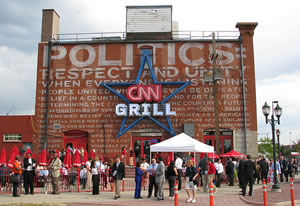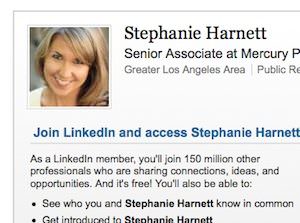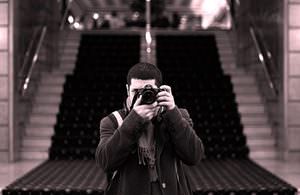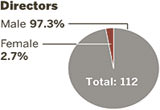The End of an Institution
I suppose I should be sad to watch the decline of the once mighty political media, an institution that trained and nurtured me. But that's not how I feel. For this was the institution that cheered when President Bush took us to war. This is also the institution that is getting this Democratic National Convention wrong, obsessed with a phony feud between Barack Obama and Hillary Clinton, wasting time interviewing that small but vengeful cult, the die-hard Hillaryites.
DENVER — I suppose I should be sad to watch the decline of the once mighty political media, an institution that trained and nurtured me.
But that’s not how I feel. For this was the institution that cheered when President Bush took us to war. These were the political reporters who were once transfixed with Barack Obama and are now ripping him to shreds. And these are the journalists who are still so awed by John McCain’s years as a prisoner of war that they won’t dig into his record.
This is also the institution that is getting this Democratic National Convention wrong, obsessed with a phony feud between Obama and Hillary Clinton, wasting time interviewing that small but vengeful cult, the die-hard Hillaryites.
That vision of the convention is not what’s happening. Rather, Democrats are beginning a process of coming together after the long and intense battle for the nomination. A few more words from Clinton — “he beat me fair and square” — would have completely sealed the deal, but she’s too much of a competitor to say that. By Election Day, the past battles will have been put aside.
Luckily, for the good of the Republic, this bad reporting has had little impact on events, unlike the effect it would have had in the past. The mass media have been weakened greatly in the last few years, hurt by a loss of readers, viewers and advertisers and the growing power of the Internet. That came through clearly on the first day of the convention when I saw the Los Angeles Times sharing a workspace with the other Tribune papers. When I was covering conventions for the Times, we had our own big workspace and all kinds of big shots came calling.
The decline of the mainstream media was discussed Tuesday at a panel on “Politics & the Media: Bridging the Political Divide in the 2008 Elections,” sponsored by the USC Annenberg Center on Communications Leadership and by Politico, a daily journal of political news that appears on the Web and in print.
Panelist John Harris, a former Washington Post reporter and editor and one of the founders of Politico, offered a lament for the past.
He said “this was a time of despair” for political journalism, threatened as it is by economics and stung by challenges from the growing pack of bloggers who treat once influential political reporters with the same contempt and condescension the mainstream journalists show to their least-favored sources.
Harris longed for the days when journalists “thought we were doing important work and having a hell of a lot of fun doing it.”
Of course it’s fun — if not intellectually challenging — to be the God-like dispenser of wisdom and to comfortably share your opinions with like-minded colleagues.
That has been how political journalism has been practiced for a long time. Beginning with the rise of the mass newspaper press in the late 19th century and of television news in the 1960s, American political and social perceptions were shaped by a relatively small coterie of owners, managers and reporters.
If they didn’t choose to report something, it might as well have not happened. For example, most Northern newspapers did not report racial discrimination in jobs, housing and schools for years, leaving their readers ignorant — and shocked by the eventual protests.
When I began covering national political campaigns for the Associated Press and later the Los Angeles Times, political developments were filtered through top columnists and reporters and their editors who shaped the news through their generally middle-of-the-road view of the world.
The student rebellion, which began in the mid- and late ’50s, was unrecognized and unreported until it burst upon the country during the Vietnam War.
With Web sites such as this one offering a variety of views, the old dominance is fading, and nowhere is this more clear than at this convention.
This Internet journalism era is in its infancy, and much of the work is pretty crude and open to criticism. But the movement is tremendously important because it provides America with a variety of voices that have long been silenced.
I see the need for those voices when I check the mainstream view of the convention, which is not what I see at the hall.
I thought Sen. Edward M. Kennedy’s speech Monday was one of the most heroic and moving moments I have ever seen in politics. Gravely ill with a brain cancer, he willed himself to fly to the convention. He spoke powerfully, and it was clear from his words what had brought him on that difficult journey. What drove him on was a cause as well as a candidate. It was health care for all Americans, and when he pledged to be in the Senate to get it passed next year I think every person in the hall prayed he would make it. I know I did.
But the moment was relegated in most of the narratives to just a part of the phony Barack-Hillary feud story: Would Teddy help Barack win over the Hillary lovers?
Hopefully this was one of last gasps of the old days. I won’t miss them.
Your support matters…Independent journalism is under threat and overshadowed by heavily funded mainstream media.
You can help level the playing field. Become a member.
Your tax-deductible contribution keeps us digging beneath the headlines to give you thought-provoking, investigative reporting and analysis that unearths what's really happening- without compromise.
Give today to support our courageous, independent journalists.




You need to be a supporter to comment.
There are currently no responses to this article.
Be the first to respond.